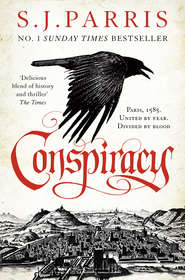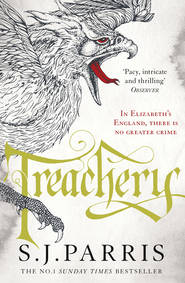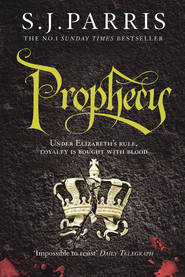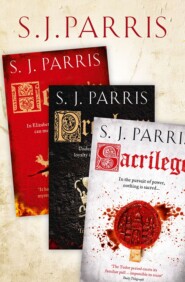По всем вопросам обращайтесь на: info@litportal.ru
(©) 2003-2024.
✖
Heresy
Автор
Год написания книги
2019
Настройки чтения
Размер шрифта
Высота строк
Поля
‘Then I must get out before they have the chance. Perhaps I will go to France.’
I turned away to look for my cloak. There flashed into my memory, as clear as the day it was first imprinted, the image of a man consumed by fire, his head twisted back in agony as he tried in vain to turn his face from the heat of the flames that tore hungrily at his clothes. It was that human, fruitless gesture that stayed with me in the years afterwards – that movement to protect his face from the fire, though his head was bound to a stake – and since then I had deliberately avoided the spectacle of another burning. I had been twelve years old, and my father, a professional soldier and a man of orthodox and sincere belief, had taken me to Rome to watch a public execution for my edification and instruction. We had secured a good vantage point for ourselves in the Campo dei Fiori towards the back of the jostling crowd, and I had been amazed at how many had gathered to make profit from the event as if it were a bear-baiting or a fair: sellers of pamphlets, mendicant friars, men and women peddling bread and cakes or fried fish from trays around their necks. Neither had I expected the cruelty of the crowd, who mocked the prisoner with insults, spitting and throwing stones at him as he was led silently to the stake, his head bowed. I wondered if his silence were defeat or dignity, but my father explained that an iron spike had been driven through his tongue so that he could not try to convert the spectators by repeating his foul heresies from the pyre.
He was tied to the stake and the faggots piled around him so that he was almost hidden from view. When a torch was held to the wood, there was an almighty crackling and the kindling caught light immediately and burned with a fierce glow. My father had nodded in approval; sometimes, he explained, if the authorities feel merciful, they allow green wood to be used for the pyre, so that the prisoner will often suffocate from the smoke before he truly suffers the sting of the flames. But for the worst kind of heretics – witches, sorcerers, blasphemers, Lutherans, the Benandanti – they would be sure the wood was dry as the slopes of Monte Cicala in summer, so that the heat of the flames would tear at the offender until he screamed out to God with his last breath in true repentance.
I wanted to look away as the flames rushed to devour the man’s face, but my father was planted solidly beside me, his gaze unflinching, as if watching the poor wretch’s agonies were an essential part of his own duty to God, and I did not want to appear less manly or less devout than he. I heard the mangled shrieks that escaped the condemned man’s torn mouth as his eyeballs popped, I heard the hiss and crackle as his skin shrivelled and peeled away and the bloody pulp beneath melted into the flames, I smelled the charred flesh that reminded me horribly of the boar that was always roasted over a pit at street festivals in Nola. Indeed, the cheering and exultation of the crowd when the heretic finally expired was like nothing so much as a saint’s day or public holiday. On the way home I asked my father why the man had had to die so horribly. Had he killed someone? My father told me that he had been a heretic. When I pressed him to explain what a heretic was, he said the man had defied the authority of the pope by denying the existence of Purgatory. So I learned that, in Italy, words and ideas are considered as dangerous as swords and arrows, and that a philosopher or a scientist needs as much courage as a soldier to speak his mind.
Somewhere in the dormitory building I heard a door slam violently.
‘They are coming,’ I whispered frantically to Paolo. ‘Where the devil is my cloak?’
‘Here.’ He handed me his own, pausing a moment to tuck it around my shoulders. ‘And take this.’ He pressed into my hand a small bone-handled dagger in a leather sheath. I looked at him in surprise. ‘It was a gift from my father,’ he whispered. ‘You will have more need of it than I, where you are going. And now, sbrigati. Hurry.’
The narrow window of our cell was just large enough for me to squeeze myself on to the ledge, one leg at a time. We were on the first floor of the building, but about six feet below the window the sloping roof of the lay brothers’ reredorter jutted out enough for me to land on if I judged the fall carefully; from there I could edge my way down a buttress and, assuming I could make it across the garden without being seen, I could climb the outside wall of the monastery and disappear into the streets of Naples under cover of darkness.
I tucked the dagger inside my habit, slung my oilskin pack over one shoulder and climbed to the ledge, pausing astride the window sill to look out. A gibbous moon hung, pale and swollen, over the city, smoky trails of cloud drifting across its face. Outside there was only silence. For a moment I felt suspended between two lives. I had been a monk for thirteen years; when I lifted my left leg through the window and dropped to the roof below I would be turning my back on that life for good. Paolo was right; I would be ex communicated for leaving my order, whatever other charges were levelled at me. He looked up at me, his face full of wordless grief, and reached for my hand. I leaned down to kiss his knuckles when I heard again the emphatic stride of many feet thundering down the passageway outside.
‘Dio sia con te,’ Paolo whispered, as I pulled myself through the small window and twisted my body around so that I was hanging by my fingertips, tearing my habit as I did so. Then, trusting to God and chance, I let go. As I landed clumsily on the roof below, I heard the sound of the little casement closing and hoped Paolo had been in time.
The moonlight was a blessing and a curse; I kept close to the shadows of the wall as I crossed the garden behind the monks’ quarters and, with the help of wild vines, I managed to pull myself over the far wall, the boundary of the monastery, where I dropped to the ground and rolled down a short slope to the road. Immediately I had to throw myself into the shadow of a doorway, trusting to the darkness to cover me, because a rider on a black horse was galloping urgently up the narrow street in the direction of the monastery, his cloak undulating behind him. It was only when I lifted my head, feeling the blood pounding in my throat, and recognised the round brim of his hat as he disappeared up the hill towards the main gate, that I knew the figure who had passed was the local Father Inquisitor, summoned in my honour.
That night I slept in a ditch on the outskirts of Naples when I could walk no further, Paolo’s cloak a poor defence against the frosty night. On the second day, I earned a bed for the night and a half-loaf of bread by working in the stables of a roadside inn; that night, a man attacked me while I slept and I woke with cracked ribs, a bloody nose and no bread, but at least he had used his fists and not a knife, as I soon learned was common among the vagrants and travellers who frequented the inns and taverns on the road to Rome. By the third day, I was learning to be vigilant, and I was more than halfway to Rome. Already I missed the familiar routines of monastic life that had governed my days for so long, and already I was thrilled by the notion of freedom. I no longer had any master except my own imagination. In Rome I would be walking into the lion’s maw, but I liked the boldness of the wager with Providence; either my life would begin again as a free man, or the Inquisition would track me down and feed me to the flames. But I would do everything in my power to ensure it was not the latter – I was not afraid to die for my beliefs, but not until I had determined which beliefs were worth dying for.
PART ONE (#ulink_343c7d02-39b5-5852-87df-29f4f6355e6d)
ONE (#ulink_56e10d3c-8a99-5622-8df4-95d4a34d9004)
On a horse borrowed from the French ambassador to the court of Queen Elizabeth of England, I rode out across London Bridge on the morning of 20th May 1583. The sun was strong already, though it was not yet noon; diamonds of light scattered across the ruffled surface of the wide Thames and a warm breeze lifted my hair away from my face, carrying with it the sewer stinks of the river. My heart swelled with anticipation as I reached the south bank and turned right along the river towards Winchester House, where I would meet the royal party to embark upon our journey to the renowned University of Oxford.
The palace of the bishops of Winchester was built of red brick in the English style around a courtyard, its roof decorated with ornate chimneys over the great hall with its rows of tall perpendicular windows facing the river. In front of this a lawn sloped down to a large wharf and landing place where I now saw, as I approached, a colourful spectacle of people thronging the grass. Snatches of tunes carried through the air as musicians rehearsed, and half of London society appeared to have turned out in its best clothes to watch the pageant in the spring sunshine. By the steps, servants were making ready a grand boat, decked out with rich silk hangings and cushions tapestried in red and gold. At the front were seats for eight oarsmen, and at the back an elaborate embroidered canopy sheltered the seats. Jewel-coloured banners rippled in the light wind, catching the sunlight.
I dismounted, and a servant came to hold the horse while I walked towards the house, eyed suspiciously by various finely dressed gentlemen as we passed. Suddenly I felt a fist land between my shoulder blades, almost knocking me to the ground.
‘Giordano Bruno, you old dog! Have they not burned you yet?’
Recovering my balance, I spun around to see Philip Sidney standing there grinning from ear to ear, his arms wide, legs planted firmly astride, his hair still styled in that peculiar quiff that stuck up at the front like a schoolboy hastened out of bed. Sidney, the aristocratic soldier-poet I had met in Padua as I fled through Italy.
‘They’d have to catch me first, Philip,’ I said, smiling broadly at the sight of him.
‘It’s Sir Philip to you, you churl – I’ve been knighted this year, you know.’
‘Excellent! Does that mean you’ll acquire some manners?’
He threw his arms around me then and thumped me heartily on the back again. Ours was a curious friendship, I reflected, catching my breath and embracing him in return. Our backgrounds could not have been more different – Sidney was born into one of the first families of the English court, as he had never tired of reminding me – but in Padua we had immediately discovered the gift of making one another laugh, a rare and welcome thing in that earnest and often sombre place. Even now, after six years, I felt no awkwardness in his company; straight away we had fallen into our old custom of affectionate baiting.
‘Come, Bruno,’ Sidney said, putting an arm around my shoulders and leading me down the lawn towards the river. ‘By God, it is a fine thing to see you again. This royal visitation to Oxford would have been intolerable without your company. Have you heard of this Polish prince?’
I shook my head. Sidney rolled his eyes.
‘Well, you will meet him soon enough. The Palatine Albert Laski – a Polish dignitary with too much money and too few responsibilities, who consequently spends his time making a nuisance of himself around the courts of Europe. He was supposed to travel from here to Paris, but King Henri of France refuses to allow him into the country, so Her Majesty is stuck with the burden of his entertainment a while longer. Hence this elaborate pageant to get him away from court.’ He waved towards the barge, then glanced around briefly to make sure we were not overheard. ‘I do not blame the French king for refusing his visit, he is a singularly unbearable man. Still, it is quite an achievement – I can think of one or two taverns where I am refused entry, but to be barred from an entire country requires a particular talent for making yourself unwelcome. Which Laski has by the cartload, as you shall see. But you and I shall have a merry time in Oxford none the less – you will amaze the dullards there with your ideas, and I shall look forward to basking in your glory and showing you my old haunts,’ he said, punching me heartily again on the arm. ‘Although, as you know, that is not our whole purpose,’ he added, lowering his voice.
We stood side by side looking out over the river, busy then with little crafts, wherries and small white-sailed boats criss-crossing the shining water in the spring sun, which illuminated the fronts of the handsome brick and timber buildings along the opposite bank, a glorious panorama with the great spire of St Paul’s church towering over the rooftops far to the north. I thought what a magnificent city London was in our age, and how fortunate I was to be here at all, and in such company. I waited for Sidney to elaborate.
‘I have something for you from my future father-in-law, Sir Francis Walsingham,’ he whispered, his eyes still fixed on the river. ‘See what a knighthood gets me, Bruno – a job as your errand boy.’ He drew himself upright and looked about, shielding his eyes with his hand as he peered towards the mooring-place of our craft, before reaching for the oilskin bag he carried and pulling from it a bulging leather purse. ‘Walsingham sent this for you. You may incur certain expenses in the course of your enquiries. Call it an advance against payment.’
Sir Francis Walsingham. Queen Elizabeth’s Principal Secretary of State, the man behind my unlikely presence on this royal visitation to Oxford; even his name made my spine prickle.
We walked a little further off from the body of the crowd gathered to marvel as the barge was decked with flowers for our departure. Beside it, a group of musicians had struck up a dance tune and we watched the crowd milling around them.
‘But now tell me, Bruno – you have not set your sights upon Oxford merely to debate Copernicus before a host of dull-witted academicians,’ Sidney continued, in a low voice. ‘I knew as soon as I heard you had come to England that you must be on the scent of something important.’
I glanced quickly around to be sure no one was within earshot.
‘I have come to find a book,’ I said. ‘One I have sought for some time, and now I believe it was brought to England.’
‘I knew it!’ Sidney grabbed my arm and drew me closer. ‘And what is in this book? Some dark art to unlock the power of the universe? You were dabbling in such things in Padua, as I recall.’
I could not tell whether he was mocking me still, but I decided to trust to what our friendship had been in Italy.
‘What would you say, Philip, if I told you the universe was infinite?’
He looked doubtful.
‘I would say that this goes beyond even the Copernican heresy, and that you should keep your voice down.’
‘Well, this is what I believe,’ I said, quietly. ‘Copernicus told only half the truth. Aristotle’s picture of the cosmos, with the fixed stars and the six planets that orbit the earth – this is pure falsehood. Copernicus replaced the Earth with the Sun as the centre of the cosmos, but I go further – I say there are many suns, many centres – as many as there are stars in the sky. The universe is infinite, and if this is so, why should it not be populated with other earths, other worlds, and other beings like ourselves? I have decided it will be my life’s work to prove this.’
‘How can it be proved?’
‘I will see them,’ I said, looking out over the river, not daring to watch his reaction. ‘I will penetrate the far reaches of the universe, beyond the spheres.’
‘And how exactly will you do this? Will you learn to fly?’ His voice was sceptical now; I could not blame him.
‘By the secret knowledge contained in the lost book of the Egyptian sage Hermes Trismegistus, who first understood these mysteries. If I can trace it, I will learn the secrets necessary to rise up through the spheres by the light of divine understanding and enter the Divine Mind.’
‘Enter the mind of God, Bruno?’
‘No, listen. Since I saw you last I have studied in depth the ancient magic of the Hermetic writings and the Cabala of the Hebrews, and I have begun to understand such things as you would not believe possible.’ I hesitated. ‘If I can learn how to make the ascent Hermes describes, I will glimpse what lies beyond the known cosmos – the universe without end, and the universal soul, of which we are all a part.’
I thought he might laugh then, but instead he looked thoughtful.
‘Sounds like dangerous sorcery to me, Bruno. And what would you prove? That there is no God?’
‘That we are all God,’ I said, quietly. ‘The divinity is in all of us, and in the substance of the universe. With the right knowledge, we can draw down all the powers of the cosmos. When we understand this, we can become equal to God.’
Sidney stared at me in disbelief.
‘Christ’s blood, Bruno! You cannot go about proclaiming yourself equal to God. We may not have the Inquisition here but no Christian church will hear that with equanimity – you will be straight for the fire.’











